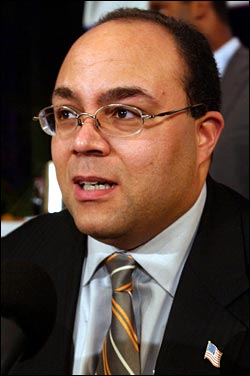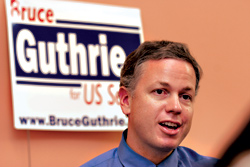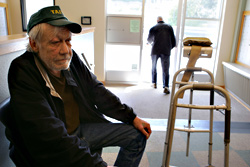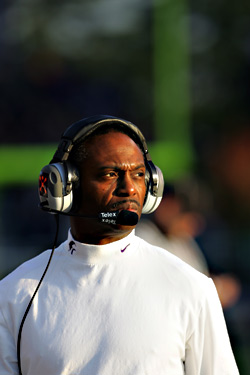Michael Powell is a man on a mission to deregulate telecommunications and rewrite media ownership regulations in the United States. He’s in a good spot to do just thatPowell is chairman of the Federal Communications Commission (and son of Secretary of State Colin Powell).
Last autumn, Powell asked the FCC to review a slew of media ownership rules. The intent of the rules is to keep a Citizen Kane-like figure from owning too much of the media and shutting down democratic discourse by skewing news and information to suit their narrow political interests. Powell’s move resulted from court challenges of the rules and the 1996 Telecommunications Act, which requires that the FCC review and justify its rules every two years or they’ll expire, according to an FCC spokesperson.
Critics say Powell is using these requirements as a wedge to forward his deregulation agenda.
Now that review is coming to a head. Last week, a public hearing on proposed changes was held in Richmond, Va. Despite the potential impact of the changes, Powell told Congress last week that only one hearing was needed. Powell and his four fellow FCC commissioners are expected to vote on rule changes sometime in May.
But FCC Commissioner Michael Copps isn’t buying Powell’s approach. He’s scheduled his own hearings on media deregulation. The first will be held at the University of Washington’s HUB Auditorium on Friday, March 7 at 9 a.m.
Copps says that, unlike Powell, he’s committed to “the need to get out into various parts of the country” to hear what non-Beltway people have to say on the matter. Last week’s hearing in Virginia was dominated by corporate lobbyists.
What’s at stake, Copps says, is nothing less than democracy itself.
“Some people have tried to define this as a narrow technical proceeding,” he says. “But it’s a very profound and important proceeding. I don’t think it exaggerates a bit to say that fundamental components of democracy are at stake when the airwaves belong to the public. This is about how we discuss issues and how we disseminate them. We need to get this issue before the American people.”
At issue are arcane rules governing media ownership. The FCC regulates broadcast media because radio and television use the public airwaves, which are licensed by the FCC. Among the rules up for change are a ban on television or radio stations owning a newspaper in the same market (the cross-ownership rule), a ban on a company owning two television stations in the same market (the duopoly rule), a rule preventing companies from owning television stations that serve more than 35 percent of the U.S. population, as well as a rule limiting companies to eight radio stations per market.
Critics of changing the rules cite the deregulation of the radio market in 1996 as a prime example of how loosening FCC rules has hampered public access to the airwaves, concentrated ownership in the hands of a few corporations, and utterly destroyed localism in radio markets. Prior to 1996, companies such as Clear Channel Communications were only allowed to own 40 stations nationwide; now, they can own as many as they desire with the only limit being eight stations in any given market. Currently, Clear Channel owns 1,240 radio stations across the country. As have other radio conglomerates like Entercom Communications Corp. and Infinity Broadcasting, it has centralized music broadcasting at a remote corporate site and introduced the same song playlist to diverse markets around the country. (Together, Clear Channel, Entercom, and Infinity own 15 of Seattle’s 29 commercial radio stations.)
“When they raised the caps, it had this devastating effect on radio,” says Jenny Toomey, executive director of the Future of Music Coalition. “It’s scrunched the amount of music people have access to.”
Critics say Powell is tinkering with the lifeblood of democracy.
“The media serve an important role in democracy,” says Jonathan Lawson of Seattle’s Reclaim the Media, a media activist group. “Having a free media system means the public airwaves are filled with diverse opinionsit’s really the oxygen of democracy.”
Chief among the critics is Frank Blethen, publisher of The Seattle Times.
“Repeal would be a giant crack in the foundation of our democracy,” Blethen testified at the FCC’s hearing in Virginia last week. “The specter of media dominance by a small handful of conglomerates controlled by faceless financial investors and driven by CEO stock options is enough to scare George Orwell.”
“A handful of media companies are trying to circle the Internet and control all the major media outlets,” says Jeff Chester, executive director of the Center for Digital Democracy, referring to companies like AOL Time Warner and Disney. “They do little to promote civic engagement and arts and culture. It’s about advertising and clicks.”
“The media is not about economic efficiency, it’s about diversity and debate,” says Mark Cooper of the Consumer Federation of America. “Should we allow concentration and consolidation in these markets?” He points to the current landscape where five major companies (AOL Time Warner, Viacom, General Electric, Disney, and News Corporation) control as much as 80 percent of the television programming in the United States.
Powell argued in Richmond last week that these rules are outmoded by the growth of cable television and the Internet. He claimed that there are so many sources of information and news that it’s not possible for one or two companies to dominate the American media.
The broadcast and newspaper industries largely agree with Powell.
“The cross-ownership rule has long since outlived whatever validity it had when it was established in 1975,” says John Sturm, president and CEO of the Newspaper Association of America, an industry trade group. “We are in a totally different media world than 28 years ago.”
Sturm points to 40 marketseverywhere from Chicago to Miles City, Mont.where there is already cross-ownership of television stations and newspapers. These exceptions to the current rule existed before the cross-ownership rule went into effect and were allowed to remain in place under a grandfather clause. He says, “Nothing bad has happened” in those markets.
“The rule must be repealed,” Sturm says. “If the commission won’t, the courts will.”
Cross-ownership could become a touchy issue in Seattle. A long-standing rumor has it that the Hearst Corp., owner of the Seattle Post-Intelligencer, is interested in buying KOMO-TV. In written comments to the FCC, both Hearst and its television subsidiary called for the rule to be lifted.
The National Association of Broadcasters, an industry group, wants to see the duopoly rule lifted in small and medium-sized television markets so that stations could combine their operations, according to a spokesperson for the group. NAB, however, does not want single companies to own TV stations that serve more than 35 percent of the nation.
The rules review has gone on under a virtual press blackout. Until the Richmond hearing last week, there was scant coverage of the proposed rule changes in the national media. To date, there has been but one television network news account of the proceedings (at 4 a.m., no less) and stray mentions in newspapers like The New York Times and The Washington Post. And, while the P-I has written about the upcoming Seattle hearing, it’s failed to mention its parent company’s advocating for changing the rules.
“One only needs to ask why FCC pleadings to relax radio and TV concentration rules and to repeal the cross-ownership ban have been outside the bright light of press scrutiny,” Blethen told the FCC last week. “When huge corporations, lobbying only for their own financial self-interest, also control most of our newsrooms, does anybody wonder why there is a chill?”
The Seattle Times editorialized against lifting the cross-ownership ban in January.
Reclaim the Media and other groups are holding “The Future of Media” at 7 p.m. on Fri., March 7 at Experience Music Project. Appearing will be rapper Chuck D and FCC Commissioner Jonathan Adelstein.








